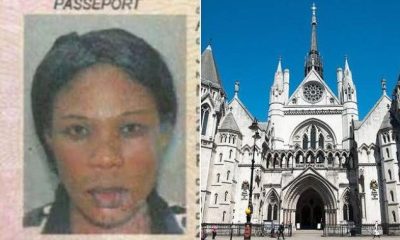News
Death-for-fowl: Osun man thanks Nigerians as he leaves prison after 14 years

Segun Olowookere, a man who was arrested at the age of 17 in 2010 for allegedly stealing a fowl and subsequently sentenced to death, has been released from prison after spending 14 years in detention.
His release was made possible by clemency granted by the Governor of Osun State, Ademola Adeleke after his case garnered widespread attention.
Actress Abiola Adebayo shared the news in a video posted on Instagram on Monday.
In the video, Adebayo is seen with Segun and his parents as they celebrate his release from Kiri Kiri Correctional Centre in Lagos State.
“This is Segun Olowookere. We’re just leaving Kiri Kiri; he’s finally out of the correctional centre. Thank you so much for the love and support,” Adebayo said in the video.
She went on to share positive words about Segun, describing him as “a good guy” and noting that many inmates at the correctional centre had expressed sadness at his departure. “The testimonies, even at the correctional centre, have been amazing. In fact, some of them were crying that he was leaving,” Adebayo added.
The actress also expressed her gratitude to Adeleke for intervening in the case and granting clemency to Segun.
“We just want him to be a better person, to be useful to society, Nigeria, Africa, and the whole world,” Adebayo said, asking Nigerians for support to help Segun reintegrate into society.
Segun also thanked Nigerians, saying, “Thank you, everybody. Thank you so much. I really appreciate it.”
The video also revealed his parents rejoicing that they are finally having a joyful festive season.
Recall that Segun’s parents had recently, in an interview on the Talk to B show, hosted by the actress, described the chain of events that led to Segun’s conviction, their only child, and the subsequent years of hardship.
Segun’s mother, Folashade, had, during the interview, lamented how the incident had shattered their family and how they had not experienced a joyful festive season since their son’s arrest.
News
‘Except I die, I have 3 more years,’ Uzodimma hints at Imo’s next Gov

Imo State Governor, Hope Uzodimma, has shared his thoughts on the qualities he hopes to see in the next governor of the state after his tenure ends.
The governor made these remarks during a meeting with political leaders from Imo East Senatorial District, also known as Owerri Zone, under the Owerri Harmony Project at the Government House in Owerri on Tuesday.
While discussing the future, Uzodimma reminded the attendees that he still has three years left in office unless, as he jokingly put it, he is poisoned. He emphasized the importance of allowing him to complete his tenure in peace, warning against political tensions that could disrupt the state’s progress.
Uzodimma said, “I will not solve all the problems in Imo. I will address what I can, but my successor must be able to handle others. We need someone who values merit and can be courageous in the face of challenges.”
The governor reflected on the insecurity that marked his rise to office, noting that, by God’s grace, he had overcome it. He stressed that his successor must be bold, focused, and able to take necessary actions when required. “The person who will succeed me may not be a troublemaker, but they must be ready to fight if the situation calls for it,” he said.
Uzodimma also cautioned his audience about external forces that might try to sway them during elections. “Very soon, external forces will approach you, claiming you are the best candidate and offering incentives,” he warned. “But after the elections, they will abandon you. We must focus on the collective good, not just personal desires.”
In a lighthearted remark, Uzodimma added, “I am not discussing politics right now because I still have three years left in office unless, of course, you want to poison me here!” He urged the group to prioritize awareness, consultation, reconciliation, and unity as they approach the political future of Imo State. Politics, he concluded, should be pursued with love, understanding, and a focus on progress rather than confrontation.
Uzodimma, who took office as the governor of Imo State in a highly controversial manner, went on to win a landslide victory in his re-election.
News
Wike: After Fubara Demolished Assembly Complex How Can He visit there when he’s not invited

Ex- Rivers State Governor Nyesom Wike has queried his successor, Governor Siminalayi Fubara, for attempting to visit the Rivers State House of Assembly Quarters after he had demolished it in December 2023.
In a media chat held in Abuja on Wednesday, Wike, now the current Minister of the Federal Capital Territory (FCT), stated that Fubara should have waited for approval from the Martins Amaewhule-led Assembly before showing up. Amaewhule, who is loyal to Wike, had been recognized by the Supreme Court’s verdict on February 28, 2025, as the legitimate Speaker of the House.
Fubara arrived at the Assembly Quarters on Wednesday to present the 2025 Budget, a move directed by the Assembly. However, he was locked out upon arrival, causing a stir.
Wike explained that he had communicated his visit plans to Amaewhule, and the Rivers State Government had shared a formal letter notifying the Assembly of the governor’s intended presence.
Despite this, Wike expressed his disapproval, saying, “If you write a letter to the Assembly, won’t you wait for a response? He is playing to the gallery.
He has brought television crews to showcase his actions. It’s wrong.” Wike compared the situation to a hypothetical scenario where the president could simply show up at the National Assembly without proper procedure.
The former governor added that the demolition of the Assembly Complex had left the Assembly meeting at their residence, and proper arrangements were necessary for such a visit. “You cannot just open the gate and say, ‘I’m coming to present the budget’. Nonsense. Rubbish. Who does that?” Wike criticized Fubara for disrespecting the process and “playing to the gallery.”
Wike emphasized that such actions only served to distract and draw attention away from the real issues at hand.
News
FCTA to expend N39bn to rehabilitate Abuja International Conference Centre – Wike

By Kayode Sanni-Arewa
The Minister of the Federal Capital Territory (FCT), Nyesom Wike, has said the FCT Administration is expending N39 billion on the rehabilitation of the Abuja International Conference Centre.
Wike revealed this in Abuja on Wednesday, when he inspected the ongoing renovation of the centre being executed by Julius Berger.
The minister recalled that President Bola Tinubu had described the centre as an eyesore when he inaugurated the sixth Legislature of the ECOWAS Parliament on April 4, 2024.
He added that, thereafter, Tinubu directed that the centre should be shut down and mandated the FCTA to carry out a total rehabilitation of the conference centre.
Following the directive, Wike on April 8, 2024, ordered the suspension of all activities at the centre to enable the contractor to begin the rehabilitation.
He explained that the rehabilitation was necessary to give the country a befitting international conference centre
He explained that the poor state of the centre had reduced it to a mere conference centre and not an international centre.
“We are giving Nigerian the best and we thanked President Bola Tinubu for supporting the rehabilitation of the conference centre,” he said.
Wike, who said that the rehabilitation had reached between 70 and 80 per cent completion, expressed confidence that the facility would be ready for public use in May.
According to him, all the materials needed to complete the rehabilitation have been imported and are on ground.
“I am happy with what is going on. The contractor had promised to complete the renovation at the cost of N39 billion.
“I can say that they are between 70 to 80 per cent completion and they have assured us that the project would be completed and hand over to us in May.
“We are happy with the pace of work, and I am confident that in May, the centre will be one of the projects that will be inaugurated to celebrate Tinubu’s 2nd year in office.”
-

 News20 hours ago
News20 hours agoAuthentic Lawmakers Resume Sitting At Rivers Assembly After Shutting Out Governor Fubara From Presenting 2025 Budget
-

 News16 hours ago
News16 hours agoFubara’s Letter To Rivers Assembly Over S’Court Verdict Is ‘Useless’-Wike declares
-

 News21 hours ago
News21 hours agoNigerian ‘Dead Woman’ Appears In Court To Reclaim £350k London Home From Scammer
-

 News19 hours ago
News19 hours agoSAD! Angry fan k!lls female influencer during live stream
-

 News17 hours ago
News17 hours agoINSECURITY! Police rescue nine abducted surveyours after payment of N20m
-

 News17 hours ago
News17 hours agoActor’s Wife Nabbed For Allegedly Paying Assassin to K!ll Him
-

 News6 hours ago
News6 hours agoAnger in Edo as protesters hit street over Natasha’s suspension
-

 News21 hours ago
News21 hours agoProduce Hudu by March 27 or face contempt charges, Court cautions IG


















